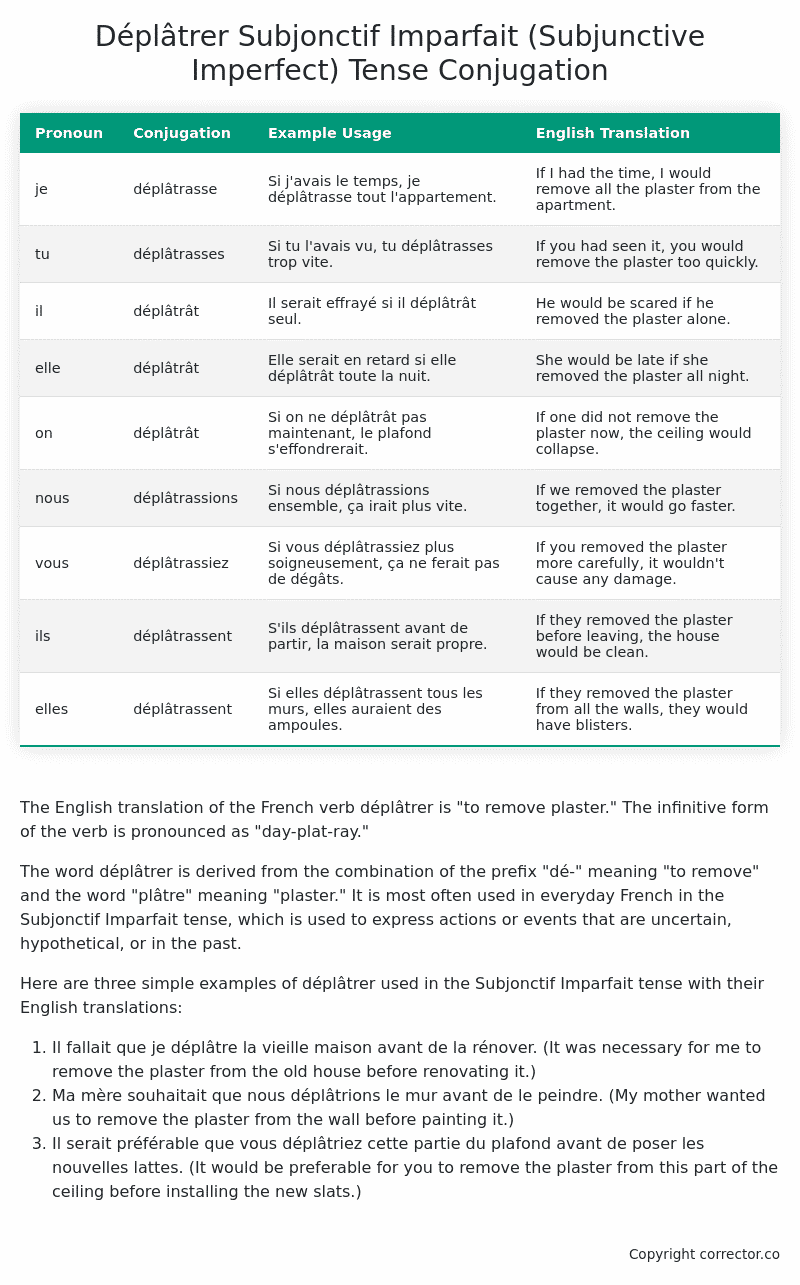Subjonctif Imparfait (Subjunctive Imperfect) Tense Conjugation of the French Verb déplâtrer
Introduction to the verb déplâtrer
The English translation of the French verb déplâtrer is “to remove plaster.” The infinitive form of the verb is pronounced as “day-plat-ray.”
The word déplâtrer is derived from the combination of the prefix “dé-” meaning “to remove” and the word “plâtre” meaning “plaster.” It is most often used in everyday French in the Subjonctif Imparfait tense, which is used to express actions or events that are uncertain, hypothetical, or in the past.
Here are three simple examples of déplâtrer used in the Subjonctif Imparfait tense with their English translations:
- Il fallait que je déplâtre la vieille maison avant de la rénover. (It was necessary for me to remove the plaster from the old house before renovating it.)
- Ma mère souhaitait que nous déplâtrions le mur avant de le peindre. (My mother wanted us to remove the plaster from the wall before painting it.)
- Il serait préférable que vous déplâtriez cette partie du plafond avant de poser les nouvelles lattes. (It would be preferable for you to remove the plaster from this part of the ceiling before installing the new slats.)
Table of the Subjonctif Imparfait (Subjunctive Imperfect) Tense Conjugation of déplâtrer
| Pronoun | Conjugation | Example Usage | English Translation |
|---|---|---|---|
| je | déplâtrasse | Si j’avais le temps, je déplâtrasse tout l’appartement. | If I had the time, I would remove all the plaster from the apartment. |
| tu | déplâtrasses | Si tu l’avais vu, tu déplâtrasses trop vite. | If you had seen it, you would remove the plaster too quickly. |
| il | déplâtrât | Il serait effrayé si il déplâtrât seul. | He would be scared if he removed the plaster alone. |
| elle | déplâtrât | Elle serait en retard si elle déplâtrât toute la nuit. | She would be late if she removed the plaster all night. |
| on | déplâtrât | Si on ne déplâtrât pas maintenant, le plafond s’effondrerait. | If one did not remove the plaster now, the ceiling would collapse. |
| nous | déplâtrassions | Si nous déplâtrassions ensemble, ça irait plus vite. | If we removed the plaster together, it would go faster. |
| vous | déplâtrassiez | Si vous déplâtrassiez plus soigneusement, ça ne ferait pas de dégâts. | If you removed the plaster more carefully, it wouldn’t cause any damage. |
| ils | déplâtrassent | S’ils déplâtrassent avant de partir, la maison serait propre. | If they removed the plaster before leaving, the house would be clean. |
| elles | déplâtrassent | Si elles déplâtrassent tous les murs, elles auraient des ampoules. | If they removed the plaster from all the walls, they would have blisters. |
Other Conjugations for Déplâtrer.
Le Present (Present Tense) Conjugation of the French Verb déplâtrer
Imparfait (Imperfect) Tense Conjugation of the French Verb déplâtrer
Passé Simple (Simple Past) Tense Conjugation of the French Verb déplâtrer
Passé Composé (Present Perfect) Tense Conjugation of the French Verb déplâtrer
Futur Simple (Simple Future) Tense Conjugation of the French Verb déplâtrer
Futur Proche (Near Future) Tense Conjugation of the French Verb déplâtrer
Plus-que-parfait (Pluperfect) Tense Conjugation of the French Verb déplâtrer
Passé Antérieur (Past Anterior) Tense Conjugation of the French Verb déplâtrer
Futur Antérieur (Future Anterior) Tense Conjugation of the French Verb déplâtrer
Subjonctif Présent (Subjunctive Present) Tense Conjugation of the French Verb déplâtrer
Subjonctif Passé (Subjunctive Past) Tense Conjugation of the French Verb déplâtrer
Subjonctif Imparfait (Subjunctive Imperfect) Tense Conjugation of the French Verb déplâtrer (this article)
Subjonctif Plus-que-parfait (Subjunctive Pluperfect) Tense Conjugation of the French Verb déplâtrer
Conditionnel Présent (Conditional Present) Tense Conjugation of the French Verb déplâtrer
Conditionnel Passé (Conditional Past) Tense Conjugation of the French Verb déplâtrer
L’impératif Présent (Imperative Present) Tense Conjugation of the French Verb déplâtrer
L’infinitif Présent (Infinitive Present) Tense Conjugation of the French Verb déplâtrer
Struggling with French verbs or the language in general? Why not use our free French Grammar Checker – no registration required!
Get a FREE Download Study Sheet of this Conjugation 🔥
Simply right click the image below, click “save image” and get your free reference for the déplâtrer Subjonctif Imparfait tense conjugation!

Déplâtrer – About the French Subjonctif Imparfait (Subjunctive Imperfect) Tense
Formation
Common Everyday Usage Patterns
Interactions with Other Tenses
Subjonctif Présent
Indicatif Passé Composé
Conditional
Conditional Perfect
Summary
I hope you enjoyed this article on the verb déplâtrer. Still in a learning mood? Check out another TOTALLY random French verb conjugation!


